#still really want more self harm representation of adults though. still very much missing that
Explore tagged Tumblr posts
Text
absolutely screaming sobbing shaking over seeing charlies scars oh my god. its so hard to find pieces of media that normalize people having self harm scars, especially actual scars and not just fresh self harm, and seeing him with that really made me feel all sorts of things. and him talking about being scared to take his shirt off in front of nick because of his scars!!! like oh my god i related SO fucking hard. i just fucking love this part of season 3 it was such a comfort to me as someone who has self harm scars. also also him having his scars visible in public!!!!!!!!!!!!!! like im terrified to do that and it meant so much to me to see that 😭❤️ genuinely going to think about that whenever i get to the point where i might be able to do that too. it's really wonderful and im so thankful for this storyline
#heartstopper#heartstopper spoilers#charlie spring#self harm tw#every time someone has their self harm scars visible in public an angel gets their wings 😇🪽#ALSO. some of my scars are in the same place as charlies and im like omg twins#but on a more serious note i feel like media with self harm so often has the person hurting themselves on their forearms#so it was nice to get representation for all of us who dont do that. or at least self harm other places#still really want more self harm representation of adults though. still very much missing that#but this was good#s
17 notes
·
View notes
Text
7 Things I experience as a DID System. Mental Health Awareness Month.
In light of May being America’s mental health awareness month, I wanted to talk about something that has consumed my entire life for the past year and a half: Treatment and healing from a disorder that is stigmatised into the ground by poor representation and misunderstandings both socially and in the medical field. Those who are close to me know first hand how my symptoms and experiences have shaped the way I interact with the world since starting treatment, but aside from my closest friends and family, and the people I live with, I don’t normally talk about the fact that I have Dissociative Identity Disorder, and what that means to me.
Hi. My name is Atlas, some people call me Cadyn, and I am the primary host of 26 fragmented parts of my consciousness. I am not dangerous, none of my parts or alters are dangerous, and no, it is not like “Split”.
Dissociative Identity Disorder is a trauma based dissociative disorder listed in both the DSM IV and V, and is recognized as an uncommon disorder characterized by two or more distinct personality states existing within the same consciousness. These personality states come to be when natural childhood development is disrupted by severe, continued, or repetitive, trauma, the child has a natural inclination towards heavy dissociation, and a lack of adult or parental support to develop the means to cope with the things happening to them.
Unfortunately popular mental health media has seen an uptake in people viewing DID as a quirky “trait”, the ability to have functional imaginary friends living in your head... but in reality DID is a lot darker, a lot scarier, and isn’t something I’d wish upon my worst enemy. Because of this media spike I wanted to share 7 things that living with Dissociative identity disorder means to me
1. Amnesia
Living with DID means that I miss out on a lot of my life. A primary symptom of DID is amnesia. I have no solid memories before the age of 13, and the memories I do have are often skewed, incorrect, or completely false as my brain fought for a way to fill in gaps and cope with the loss of memory. I forget a lot, and not just things like forgetting where I left my wallet and keys, or forgetting the day - those do happen, but I also mean forgetting big things, important life experiences and things I wish with all my being that I could remember like my highschool graduation and my wedding reception.
I often forget important day to day things that make it difficult to maintain life as an adult, like doctors appointments, work schedules, meetings, and important daily tasks. I’ll forget that I’ve eaten at all that day and risk going days without eating, or overeating due to having no recollection of the last time I’d eaten. I forget birthdays (especially my own), anniversaries, and important holidays.
To an outsider, who has no idea what’s happening inside my head, this can come across as though I’m thoughtless or unreliable. That I am cold for forgetting an important date, or simply that I just don’t care when this very much is not the case.
2. Alienation
Oftentimes DID comes with a sense of alienation from people who you’re supposed to know. For me a really clear example of this is when I previously mentioned my childhood memories being skewed - I have a clear memory of a conversation I was having with some blood relatives a few years back in which I mentioned that one family member I had happy childhood memories of, and remembered playing together as kids, but with another family member they were practically a stranger to me. I had, and still have, no memories of ever spending time with them growing up, no memories of having any kind of relationship with them at all. My understanding of our relationship was that it was “forced” because we were family and our parents expected us to exist in the same space as we grew up, but that we never talked. But I was informed by a separate member of the family that I was very wrong, and this “stranger” was actually someone I had been close to growing up. This is a common experience with DID patients, and also a very frustrating one. It creates feelings of “You know me but I don’t know you”, and it’s extremely difficult to trust your own judgement of the people you know, because you often can’t tell if your judgement is skewed by your memories or lack thereof.
3. PTSD and Flashbacks
A diagnosis of C-PTSD (Or complex Post Traumatic Stress Disorder) is required for a diagnosis of Dissociative Identity Disorder. This means that while the individual symptoms of DID can be frustrating, scary and sometimes depressing, the most difficult aspect of DID, and the most important to focus on in treatment is the PTSD symptoms.
PTSD symptoms in DID can be extremely powerful due to the additional dissociative aspect. This can mean that for a lot of DID patients, flashbacks can produce full blown body sensations, hallucinations and terrifying delusions. This is One thing that I find incredibly difficult to talk about, but I also believe is extremely important to understand. It can be embarrassing, shameful and while I only speak for myself in saying this, can cause a lot of guilt and grief. There have been times where I have been experiencing powerful flashbacks and did not recognize my own husband, resulting in lash outs and fear towards him being delusioned into thinking that he was out to hurt me, or had harmful intent for just existing in the same space as I was.
For me, a single wiff of a familiar smell, hearing a sound, a certain color, an idea, a name, a passing thought or comment can throw my previously stable mental state into one of pure panic, hyperventilation, hallucination, delusion, fight-flight-freeze and reactionary responses. Through treatment I’ve developed adaptive and healthy coping skills and management responses but trauma responses can be so quick, and so unexpected that I don’t always have time to process my coping skills before my body and mind respond in negative ways.
4. Decision making and skewed Behavior
Because living with DID, means living with a shared or fragmented consciousness, this often means that while I may not remember, my life is still being lived during my time of memory loss. Alters or parts will take control and operate my body, reacting to things, interacting with people, completing tasks and functioning. But oftentimes parts who take control are very different from myself, and make choices and decisions that I wouldn’t normally make, and sometimes decisions I wouldn’t *ever* make. An example of this is the fact that technically I am a conservative voter, despite myself as an individual having leftist or NDP views, or decisions to leave or apply for jobs and work positions that I have no interest in, or that I don’t even have the qualifications or physique to do, or leaving ones that I personally loved and excelled at. This also reflects a lot in everyday life in more subtle things, decisions like what food to eat, things to buy, activities to do shift between parts while they’re in control.
To outsiders this can look a lot like impulsivity, lack of self-control, or lack of a sense of identity. This is a huge reason why a lot of DID patients are often misdiagnosed with Borderline Personality Disorder or Bipolar Disorder because the behaviour between alters can be so drastically different that it can look a *lot* like manic or depressive states.
5. Denial and Dismissing Trauma
A very common experience among DID patients is denial and being dismissive or disregarding the things that happened to them. I often find myself in a state of questioning whether my symptoms, my disorder, and even my trauma were ever real to begin with. In therapy I find myself saying “It’s not that big of a deal” or “It wasn’t that big of a deal” more times than I’m actually saying anything productive. A huge part of this is why I wanted to make this list, because the media, and a lot of medical circles deny that DID exists or believe it’s impossibly rare and those, while both false, can cause intense feelings of “Maybe I’m just doing this for attention”. DID is a very real, very difficult disorder to diagnose, to treat, and to live with disorder, and while it is uncommon, statistics show that approximately 1-2% of western population is diagnosed, and up to a suspected 7% are living with the disorder undiagnosed because of these misconceptions. It is not common, and it’s not something that everyone is going to have, but it is a very possible response to very real trauma and is a valid diagnosis to give to those meeting the criteria.
6. Hidden Symptoms
DID is often referred to as a “covert” presenting disorder. What this means is that most commonly outsiders, friends, family, employers and even the patient themselves can have a nearly impossible time recognizing the symptoms, and it often goes unnoticed until an event destabilizes the function of the person’s life. This can lead to a lot of backlash or denial coming from peers and family close to the person. This leads to the patient hearing a lot of: “I’ve never noticed personality changes”, “You don’t act like you have it”, “You couldn’t possibly have that”, “No, I would have noticed”, “You have to be mistaken”, “There’s no way, it would have been obvious”. And so, so much more. The reality of DID is that it’s *not* noticeable. It’s a safety response that the brain created to protect the psyche from the intense damages that come with long term trauma experiences, so it’s often designed to hide itself from abusers or perceived threats as a way to compartmentalize trauma memories and maintain the ability to survive through stress and unstable situations. Not being able to “notice” is kind of the point in most cases.
7. Wandering and Dissociative Episodes
Living with untreated or unmanaged DID can potentially be dangerous due to episodes of dissociation, “wandering” experiences (where the patient will wander away from home, family, or life in a confusion, attempt to return to a perceived life never lived, or in a state of belief that their current life is unsafe). For me this took a head last year, and was actually an event that led to the solidification that this disorder was the explanation to my experiences. According to nurses and my husband, I had wandered into the emergency room of a hospital in the middle of the night, with no idea who or where I was, with no idea how to return home, or even where home was. I was wearing a t-shirt, and it had been raining, and my body was so cold they needed to retake my vitals nearly 6 times because they were unable to get an appropriate reading. After discovering my identity, my husband was called to take me home. Working with a therapist helped to develop a safety plan during events like this to prevent harm from coming to my body, or from ending up in newly traumatic environments, but I was lucky. These situations can lead to re-traumatization, victimization, it can lead to kidnapping, assault, it can lead to being injured or harmed by environmental factors and so much more and it is so incredibly important that DID patients work with their therapist to develop solid safety plans proactively to make sure that the patient doesn’t experience any worst case scenarios during episodes like this.
Conclusion
My experiences are individual to me, and to my psyche. Not everyone will experience the disorder the same way, because not everyone experiences or responds to trauma the same way. I am so lucky, and extremely privileged to be able to access consistent care and treatment, that I found a professional who trusts me, and is focused on stabilizing and supporting. Too many people living with this disorder have no access to supportive mental health care because of the misconceptions that parts of the medical field hold regarding the legitimacy or frequency that the disorder develops, and too many peers and circles of people outcast or disregard the very real, very difficult experiences because they don’t understand the disorder, or believe it doesn’t exist, or believe it looks like split. If you, or someone you know is struggling with Dissociative symptoms, or dissociative identity disorder do not be afraid to reach out to a professional for support, and educate yourself on the reality of the disorder.
#dissociative identity disorder#DID System#dissociation#mental health awareness#mental illness#mentalhealthawareness#mental health#actuallydissociative#dissociative amnesia#education#psychotherapy#experience#actuallytraumatized#trauma#actuallydid#did/osdd
41 notes
·
View notes
Note
What does the inner child actually mean? ❤️
The inner child actually means what it says! It is a psychological metaphor, but it is very real to who you are as a person.
It essentially means that you have a child dwelling within you. The part of you that never grew up. In other words, it’s not a separate entity, more so a representation of your past experiences. Some adults have been taught that this child within must be stifled or ignored. However, in life you are still influenced by your childhood and whatever trauma, pain, or emotional baggage that exists from it. Some people do not recognize that their past has inadvertently impacted their present. A child without support and supervision is scared and lost, right? It works the same way for this inner child.
The inner child may feel lost and scared due to abandonment or other experiences - abuse, broken home, broken dynamics just to name a few. Even if you have a healthy inner child, your inner child may feel stifled by other issues. It’s not to say you have an unhealthy childhood, it’s to say there may be issues from a certain stage impacting the present.
Often, you will hear of the phrase: “reparent your inner child”. That works by taking your inner child seriously, and providing what is missing.
A lot of unexplainable emotions that are manifesting can easily be explained by the inner child. Some people may feel as though they want to throw a tantrum much like a child, or escape like they used to as a child. It often appears when you don’t feel in control of a behavior or response to a situation. You may feel or react like a kid, or how you used to cope as a kid. You may self sabotage, self harm, or have passive aggressive approaches to life.
An authentic part of this reparenting involves giving your inner child the reassurance that has been missed. You’re giving a voice to your pain. Whether you were generally loved as a child, or had a distant upbringing, there still could be something that created hurt within. It’s going back and revisiting what led you to now. This is very useful for individuals who experience extreme self hatred or self criticism, for example.
Writing a letter to the younger you and saying affirmations that acknowledge your inner child are a few actions one can take. It’s about making peace with the inner child and being conscious of the need for peace. Ask yourself what you would tell a child who is struggling to learn something difficult, such as not being so hard on themselves when they should really be experiencing joy.
85 notes
·
View notes
Text
Tangled Salt Marathon - You're Kidding Me

So we’ve finally come to the last of season two’s filler episodes. Let’s see if we can knock this one out real quick.
Summary: The front door of the mysterious seashell estate vanishes, trapping the group. They try to find another way out but find a spinning top whose magic regresses Cassandra and Lance into toddlers and Shorty into a baby. They’ve only have an hour to find the top and reverse the effects or the changes become permanent. Unfortunately neither of Rapunzel’s or Eugene’s parenting methods keep their now childish friends on task.
So Why Did No One Stand Watch Last Night?
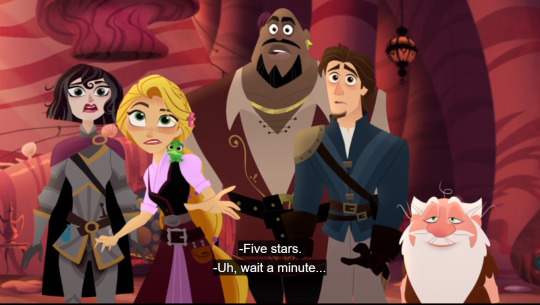

They were all sleeping right next to the entrance, and after the run in with the mirror monsters, you would think that they would have taken turns standing watch.
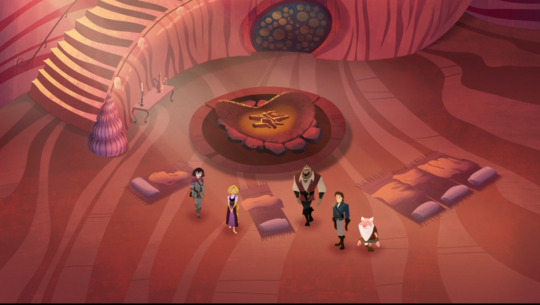
But nope, the front door vanishes when no one was looking cause they don't have any foresight.
A Low Budget Doesn’t Excuse Filler
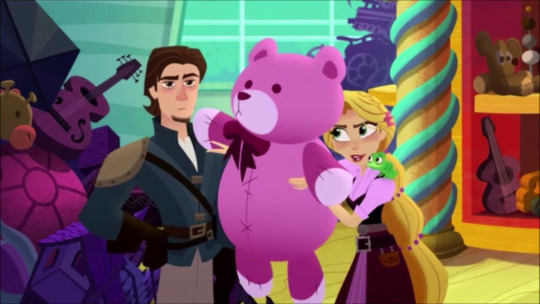
Like most of season two, this is yet another episode that adds very little to the overall story. It’s slightly better than the Return of Quaid or Curses, but not by much. I put it on the same level as The Forest of No Return, as I do like the mains’ development, but there’s really no reason why such episodes exist to begin with.
The meta reason for staying in certain places for three episodes, instead of only one or two, is because of budgetary reasons. The crew have to build new sets and models for every new location or person the cast comes across. This costs money to make, so the higher ups wanted to reuse assets. Which is understandable, but not an excuse for utilizing them poorly.
If you need to stay in one area or have characters reappear, then you need to give story reasons for that. Ones that tie back to the overall narrative and/or the mains’ character arcs.
The shell house and Matthews should be more important than what they are as they both have connections to the ultimate big bad of the series.Adria shouldn’t be wasted for a whole episode when she’s the only one driving the plot in season two and has limited appearances. Vardaros and its people shouldn’t be a one and done thing if you’re going to spend so much time setting them up. And there’s still one off episodes, locations, and characters who aren’t brought back and add nothing
Not only does this make for a weaker story, it also undermines the cost saving measures that you tried to implement to begin with.
This Isn’t Representation!


Get it?!
She’s a top!
She’s totally gay, but like not really, cause this can also be interpreted as a dominatrix joke, and there’s no other real indication of her orientation outside her like smiling at her best friend/crush/sister sometimes and keeping that rose her creepy ex-boyfriend gave her.

And don't give me any bullshit excuses about Disney not letting the crew make Cassandra canonly gay/bi.
The Owl House aired just this year, the same year as Tangled’s final season. Also Globby and Carl from Big Hero Six were both confirmed to be a couple on screen a month after this episode came out. Both shows would have been in development at the same time as Tangled was. Both would have been subject to the same regulations and restrictions while writing their stories.
It isn’t “Disney” that stopped the storyboard artists from having Cass be a confirmed lesbian, it’s Chris and Ben, the head writers themselves, who failed to write it into the story properly, if at all.
Chris is the one who made Raps and Cass “sisters”. Chris is the one who wouldn’t tell the crew about his ‘twists’. Chris is the one who had Cass crush on Andrew, even after he tried to kill her. Chris is the one who made Cassandra ‘straight’ and has since used gay baiting to keep her fanbase in his pocket.
Like I am really damn sick and tired of Casspunzel stans defending Chris on twitter, when he’s the very one who sunk thier ship to begin with. I’m also really fed up with certain fans trying to bully others for not accepting their “Cass is a lesbian” headcanons as fact because what the storyboarders say on twitter after the show is over with isn’t gospel and isn’t real rep.
I don’t care if you ship Cass with Raps or headcanon her as being gay. Ships and headcanons are great and can be a lot of fun. But fuck you if you ever try to shame people for not sharing your ships/headcanons. Not only is it biophobic and acephobic to insist that there’s only ever a binary option when it comes to orientation and shipping, but it also reinforces harmful stereotypes and tropes about people in the queer community.
Like, yes, I personally may be an introverted angry bitch who’s an LBGTQA member and activist, but that doesn’t mean that every introverted bitchy woman in media is a lesbian. What kind of message does that send people when that’s the only character archetype that’s given representation or is loudly proclaimed as ‘gay’ by the wider audience? Fuck that noise!
I Know Humor is Subjective but...WHY?

Why did we give the baby a beard? How does that logically work? Did anyone outside of the crew actually find this funny?
TTS has like this one out of touch dude throwing out jokes that don’t really land with the target audience. Fans have called it ‘boomer humor’ but it’s actually ‘Gen-X’ humor. Not only because Chris and Ben are Gen Xers but because this is the type of crap my older brother would find hilarious.
Gen Xers are between Boomers and Millennials and so their humor is this weird blend of gross out shock humor, ironic nihilism, and out of date stereotypes that are only mildly better than those of the previous generation before them. They’re the generation who gave us Beavis and Butthead, South Park, and Clerks.
That’s not a criticism of Gen X as a generation, but rather just an acknowledgment that they’re worlds away from the neo-dada absurdism, more socially conscious, and globalized humor of Gen Z.
So Why Is the Bad Guy Telling the Heroes How to Foil His Plans?
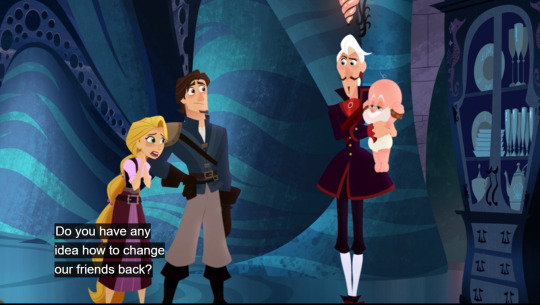

Like he not only tells them how to fix their problem and how long they got in order to do so, but he also informs them how it happened in the first place. This goes directly against his plans. Had he simply said nothing and stayed out sight, then Raps and Eugene would have been lost for the full hour and most likely not have saved everyone on time.
I like to headcanon that Mathews is just “that asshole” that loves to taunt and tease but in a that manner that gives him plausible deniability. He also may just be bored, since he’s a ghost trapped in one place all the time. Yet that still doesn’t change the fact that he shot himself in the foot here.
Raps and Young Cass’s Relationship Is the Same as Raps and Adult Cass’s, and That Is a Problem.
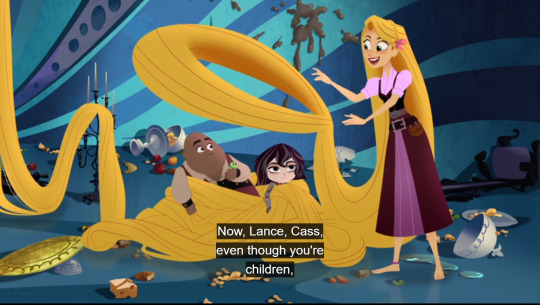
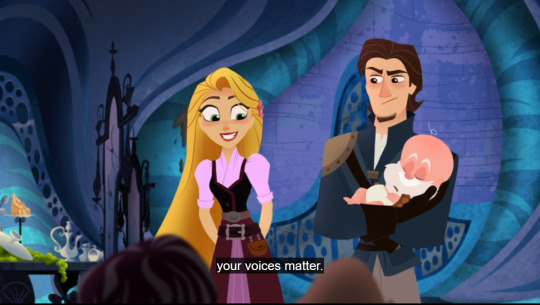
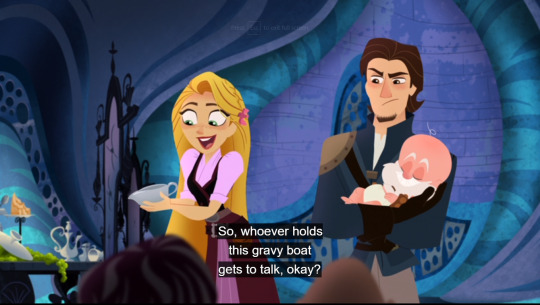
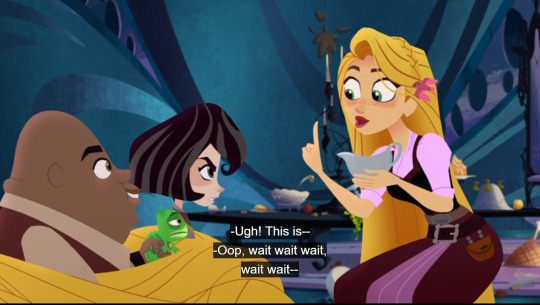
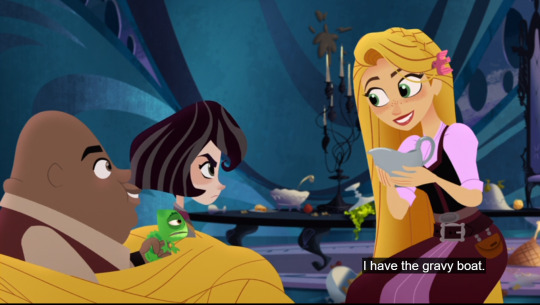
Condescending, manipulative, hypocritical, and bossy is the way Rapunzel treats everyone. She doesn’t understand the actual difference between a child and an adult. She only understands who she who she can and can’t boss around. And those people that she can’t place under her thumb are labeled antagonists by the show.
Nor does she actually care about what either kid Lance or kid Cass has to say. She’s just being proformative, and young Cass can see through that BS, which why her methods do not work. It’s not because she’s not ‘strict’ enough; it’s because she’s not being honest.
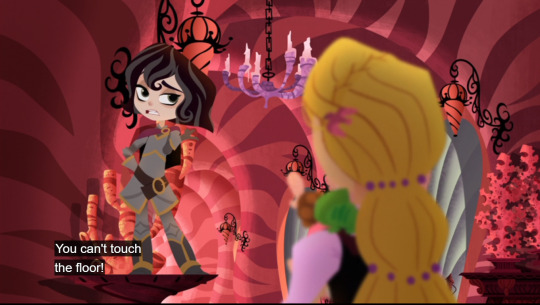

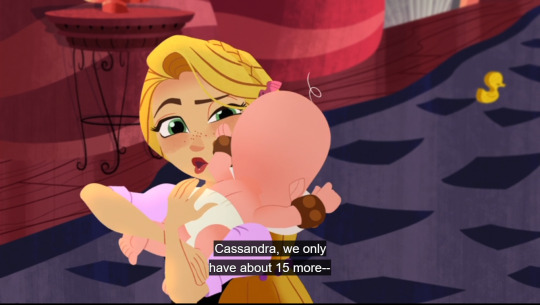

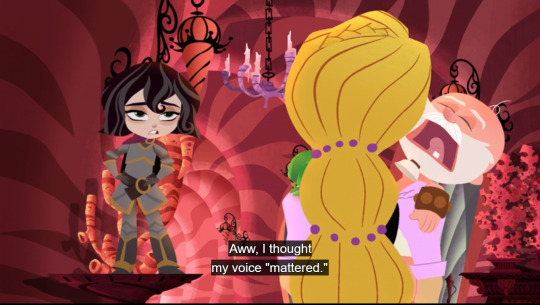
Meanwhile Child Cassandra is just as combative, rude, bullying, and entitled as Adult Cassandra. In season three she regresses even further and becomes more violent than before.
Unlike Rapunzel, Cassandra wasn’t trapped in a tower for 18 years with zero human contact outside of her abuser. She escaped that fate and was raised in a loving home. That doesn’t mean that there won't be scars, but I still expect her to be more mature than her seven year old self. Just because she’s whining about not being special enough at 24 instead of screaming about the floor being lava doesn’t mean that she’s still not throwing a temper tantrum.

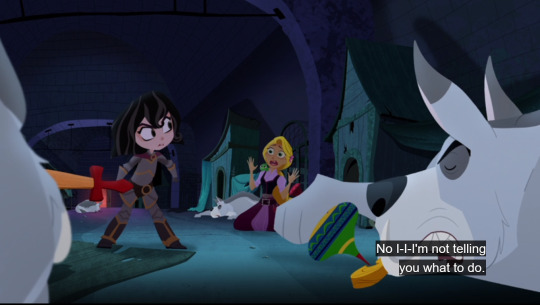
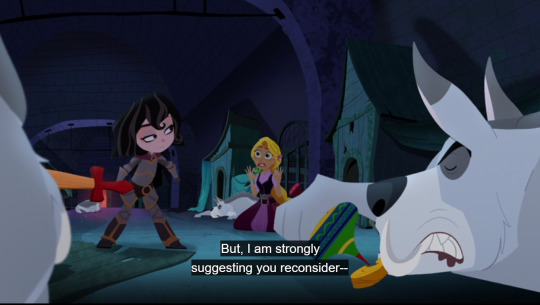
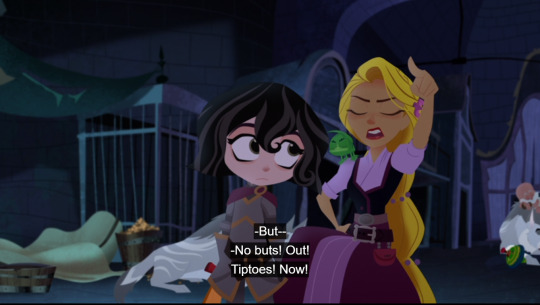

Like I should not be seeing a replay/foreshadowing of their main conflict here. They aren’t children. They’re dynamic isn’t that of a mother and child. It’s not even a big sister looking out for a little sister type relationship. Its two immature women dragging innocent victims into their bitchy cat fight for dominance over the other.
If you want me to take their issues seriously then give them real stakes to disagree over, mature behavior that I can root for, and a resolvement that doesn’t reverse any potential development that they could have had.
Matthews Plan Makes Zero Sense

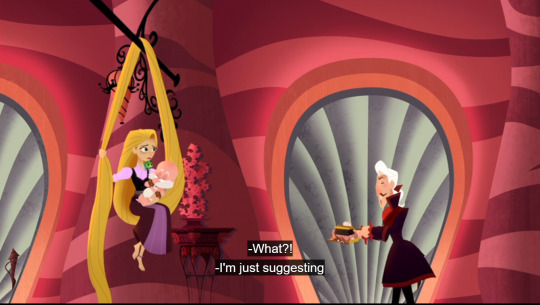

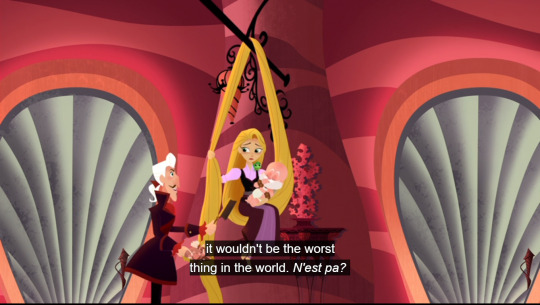
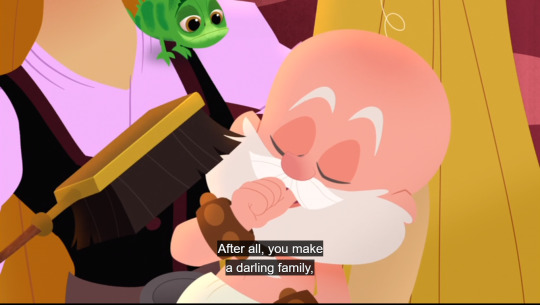

For starters, half the group being kids isn’t enough of a reason for Rapunzel to stay at the shell house. Even if the effects of the time top became permanent, then Raps and Eugene could just leave and take the kids with them. Either to finish the road trip, or go straight back to Corona. Not that there’s any real reason to get the Dark Kingdom anyways, nor is there a ticking clock stopping Raps from trying again later if she chose to.
Rapunzel also is not obligated to become anyone’s mother. If she took them back to Corona than Cap would undoubtedly raise Cassandra all over again, and Lance and Shorty could be adopted by someone else. Any of the pub thugs might take them or even perhaps the King and Queen since they missed out on raising their actual daughter. Though for my money I’d get Monty or Xavier to take them in. They seem the most mature and both are shown to be good with kids.
Then again Rapunzel has been shown twice now to not give a damn about abandoning orphans, so even the ‘dump them at an orphanage’ or ‘leave them alone in the woods to fend for themselves’ isn’t entirely off the table either. I wish I was joking, but I’m not. Sadly, only Eugene’s love for Lance might be the one thing to stop her from doing just so, and even that’s iffy.
As for the missing door from earlier, if that was all that was stopping them from leaving then the time top shenanigans were fully unnecessary altogether.
I Actually Like Eugene and Rapunzel’s Conflict Here; I Just Wish It Was In a Better Episode.



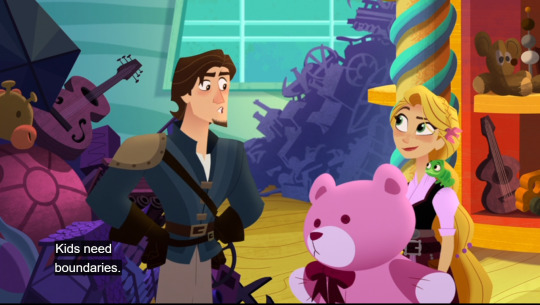

Each of their viewpoints stem from their upbringing.
Rapunzel is unique in that she was simultaneously emotionally abused and neglected while being physically spoiled. Especially once she found out that she was princess, where she was then handed nearly anything and everything she wanted. She doesn’t recognize that getting your every possible whim come true can be damaging. Nor does she have any comprehension of what living in poverty is like and how this many toys is wasteful to someone like Eugene who had so very little and stole to survive.
She does however associate limits, boundaries, and orders with abusive behavior because she’s been denied autonomy and respect her whole life. She’s never seen what healthy parenting looks like and how rules can be applied correctly.
To Rapunzel no orders is ‘freeing’ and ‘validation’ is all that is needed to get a child to listen to you. Which doesn’t work for her because she doesn’t understand that real communication is more than just giving a compliment now and then.
Meanwhile Eugene lacked any sort of anchor at all. He was left to his own devices at a young age and had no one to rely on for emotional needs and, after leaving the orphanage, no one to provide physical needs either.
It’s telling that he and Lance latched onto Quaid as the only authority figure in their life, despite Quaid never out right adopting them. He was the only sense of stability that they had who they could trust wouldn’t hurt them, despite being strict with them.
And now that Eugene has gotten older and is reformed, he can probably understand why Quaid was so harsh on him and Lance. Quaid probably did more to try and help them turn from a life crime than even Rapunzel did. Like meeting Rapunzel was the inciting incident that inspired Eugene to make that leap, but the groundwork was already laid out for him to do so elsewhere. Things like his good communication skills, respect and empathy of others, and understanding of boundaries had to be learned from somewhere, and if not from the Sheriff of Vardaros than who?
What I’m getting at is that, while Rapunzel rejects her parents methods but then fails to break her learned habits from them anyways, Eugene is the reverse. He’s come to embrace his mentor’s teachings, but he fails to implement them correctly because he’s not Quaid. Being authoritative isn’t his strong suit. It goes against his usual nature as the easy going person that he is and so any attempts to come across as forceful fail as they’re hollow.
Kids know authenticity and genuineness when they see it. The children reject Rapunzel because she’s not being real with them, yet they also reject Eugene cause he’s not being honest with himself.
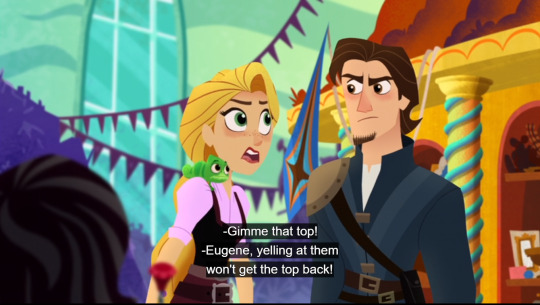
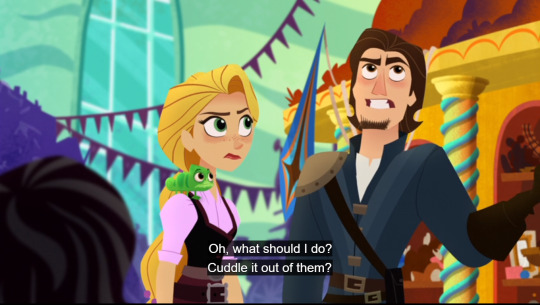


It’s a complex and mature conflict. Neither person is fully right nor wrong, and only by learning from each other and adopting both methods can they achieve their goal.
TTS can be deep when it wants to be. There’s a good foundation here for mature themes and complex characterization. It’s just the series doesn’t ever commit to it.
Whatever personal drama going on here about two young adults trying to cope with their past traumas and how that affects their current life and future goals is completely lost in the magical goofy antics and low stakes situation. Even the stuff about Eugene and his relationship with Quaid is reduced to nothing but a one off joke rather than being genuinely explored as a point of development.
Imagine how much more powerful things would have been if Angry and Red were brought along on the trip. If this argument was over them and whether or not they should adopt the two girls themselves or consider other options. That would be something with real weight. Something with a choice that had actual consequences attached to it. Something that would permanently affect all involved parties. Something that wouldn’t make the two leads look like outright dicks for abandoning two children for a second damn time in a row.
You Have 70 Feet of Magical, Indestructible Hair! Why Are You Afraid of a Bunch of Dogs!?
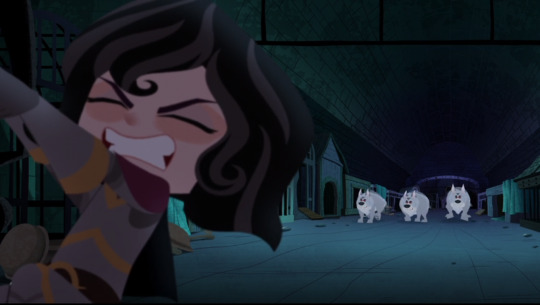
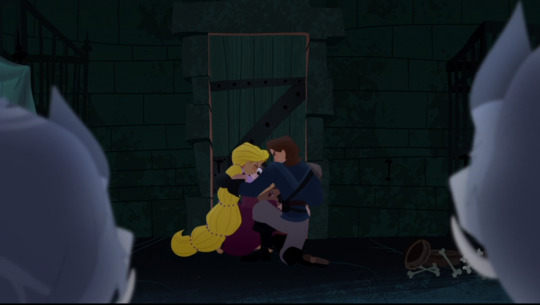
You’ve fought off giant monsters, killer robots, and supernatural beings with magical powers. What do you mean you can’t hold off a pack of guard dogs while busting down a stuck door? Why is Eugene the shield for everyone and not the actual unbreakable hair that you use as a shield all the damn time? And Why did we have to rely on Shorty again to be the deus ex machina of the episode?
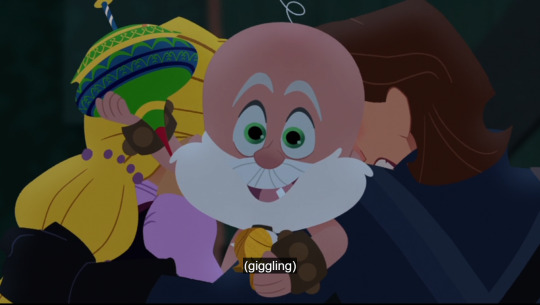
At this point the writers should have just made him Demantius instead of the monkey.
What Happened To This New Dream? Where Did It Go In Season Three?

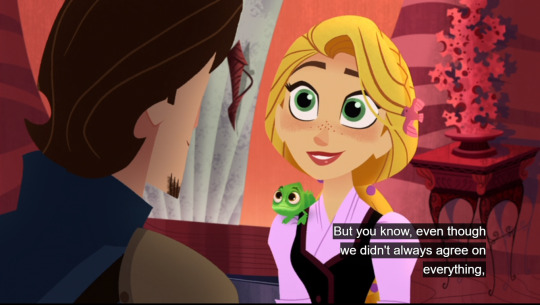
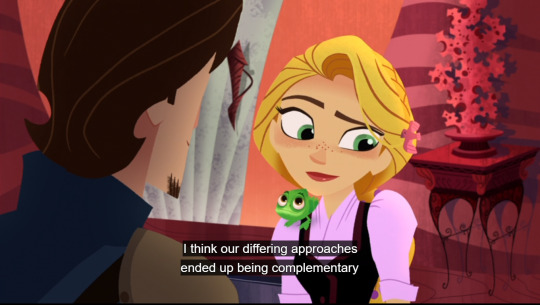
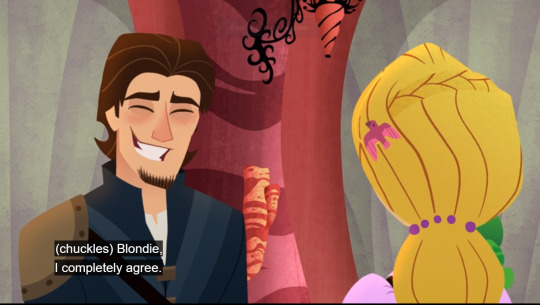
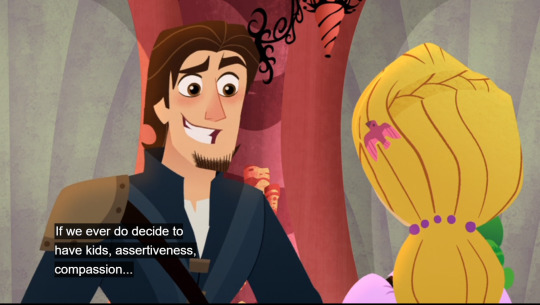
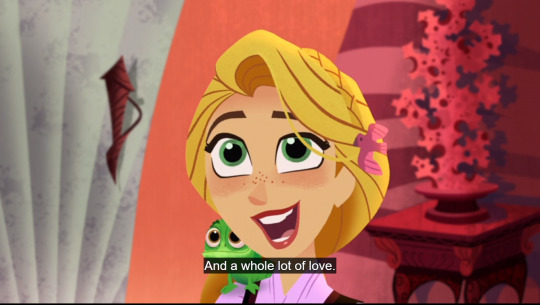
Most fans who do enjoy season two happen to be big New Dream fans as this is by far and away the best season for them. I’ll admit that the series, up to this point, had me actively liking them together, despite being originally lukewarm to the pairing in the movie.
Their conflicts were for the the most part mature and real. They learned from one another equally and had open communication when it didn't involve ‘marriage is a trap’ BS. Things, like compromising on differentiating future goals, honesty and communication, and making time for one another and extending effort into a relationship while being true to yourself are all relatable issues.
Even today's episode featured the topic of having kids and parenting. Which is a discussion you absolutely need to have with your prospective spouse before entering into any long term commitments and signing any legal contracts. For real, I’ve seen marriages fall apart because they didn’t agree on whether or not they wanted children.
I don’t know what went down between writing season two and season three, but things quickly took a sharp turn away from this dynamic and nosedived into a pit of uncomfortable bullying and gross sexist implications here after.
Matthews Plan Goes Against Zhan Tiri’s Plan

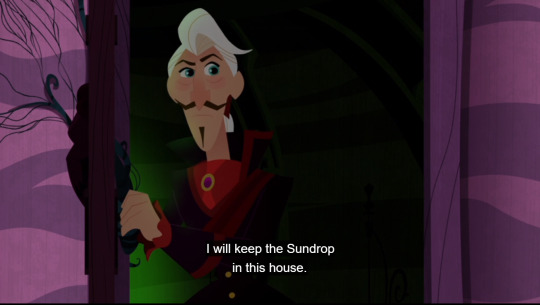
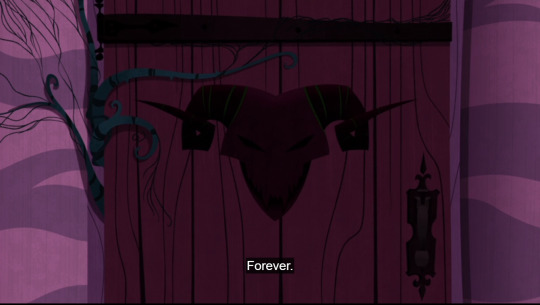
Yeah so Matthews is one of Zhan Tiri’s disciples, but he apparently doesn’t know of her goals/plans, cause she needs Rapunzel and company to reach the moonstone, not stay stuck here.
The meta reason for this that the Zhan Tiri’s story was altered at the last minute and the writers failed to make sure there was any sort of consistency between what they already set up and where they actually wound to actually taking the plot.
The in universe reason is that Zhan Tiri is an impotent moron, but that’s not what the writers were going for so it’s a fail.
Conclusion
I like the New Dream stuff, and Matthews is at least entertaining despite being incompetent. Everything else about the episode is ‘meh’ tho.
#tangled#rapunzel's tangled adventure#tangled the series#anti-tangled#anti-rapunzel#anti-cassandra#eugene
57 notes
·
View notes
Text
YA and the Bane of Adulthood
On the one hand, there's the recent post in reply to Maggie Stiefvater, with the idea that YA as a genre is changing. Here, the idea of 'adult' content and what it means is relatively broad. In the case of The Raven Cycle, it's mostly about the audience and how that audience alters the available content on the genre level in the long term. Some people have critiqued Six of Crows characters for being too adult in their thinking or abilities, but overall most readers don't seem to care about realism in fantasy YA, per se. So if Kaz talks like an adult and is improbably powerful as a major gang leader, it's more or less OK with both teenagers and adult readers. No, the critique of 'adult' readers or content goes three ways: as with the original blog post Stiefvater was responding to, one issue is the different needs and monetary resources teenagers have, and the way the industry focuses on adult interests and needs instead. A very valid point. With some YA books like Six of Crows, the problem becomes (at least potentially) the sexualization of Kaz, at least according to @krugerevengeinej. To be honest, though, online fandom doesn't get too excited unless it's a question of race representation and/or sexuality, though. When most people say certain YA books are 'too adult', they mean they're too sexual.
It's definitely awkward, isn't it? I'm not here to claim Sarah J. Maas' books are 'really' YA, and you could certainly argue they shouldn't be marketed as such, though it's hardly an issue unique to this one author or even initiated by her individually. Still, you wouldn't argue Aelin can be 'too sexualized' by adult readers, even though she's nineteen. She's having plenty of sex, after all. It's easier to talk about Kaz, because he's seventeen and sexually abstinent, so he seems more like a teen at first glance, though I'd question that. Both characters are old for their age and have experienced a lot of violence, taken care of themselves from a very young age and suffered extensive personal loss: stuff that is way out of the average teen's experience. It's pretty arguable that the Throne of Glass series is more adult than Six of Crows in any but the sexual content sense. Of course, that's what most people seem to care about, even if one reply to the @sleepingfancies SJM critique mentions that being interested in smut is normal for older teenagers. The idea is that this is the wrong kind, since smut for teens should be educational, I guess? Even though not much else about either series is really educational, in my opinion. And also it's still not properly classified as YA, which is possible but more than likely moot since it's a marketing strategy and not an inherent reflection of the subject matter involved.
Sex is always treated differently, though. It's somehow more important to be educational about sexual mores than other types of morality or ethics, which both Six of Crows and Throne of Glass consistently fail at. Kaz and Inej on the one hand, Aelin, Manon and Rowan on the other-- let's just say, do not do what they do. But no one's concerned with the authors glorifying armed robbery or assassination here. The most common source of fan concern with the changing YA market is about social justice or representation issues and the smut, like I said. Even if one has to twist the text quite a ways to make it queerbaiting, the logic goes that if we can imagine the subtext and 'symbolism', surely this is proof enough. For example, Manon loved battle, killing men and the taste of blood on her teeth, etc. Surely this means she didn't want to have sex with them, right? I mean, she wouldn't kill women unless they were Crochans... oh, wait. And of course, passionate friendship between men or women is only believable if it's hinting at a future romance. Not that any this excuses the lack of queer representation, by any means. I'm just saying, there's a difference between that and queerbaiting that overly enthusiastic fans may miss. Although I suppose that's just a separate issue and has nothing to do with adulthood or the lack thereof, honestly.
In general, I have observed that the protestations about unhealthy relationships happen no matter what, even in response to actual erotica and/or NC-17 fanfiction. It's just so neatly justified and 'obviously' relevant with the YA genre. It's extra ironic because Sarah J. Maas goes out of her way to portray an actual abusive relationship with her ACoMAF contrast between Rhys and Tamlin's behavior with Feyre. And of course, even if Rowan is Aelin's mate in the Throne of Glass books, she clearly remains super close to Dorian and Chaol, her earlier love interests. But it's easier to make fun of the educational value of the popular (and common) 'fated mates' trope and suppose it's somehow meant to disparage a girl's early relationships, or wonder if twelve-year olds should know about bodily fluids and dirty talking. In general, I think it all comes down to taking words out of context and purposely imagining an audience that doesn't exist. I mean, it seems like most twelve year-olds aren't even reading The Raven Cycle according to Stiefvater's poll, let alone the Throne of Glass books. But they *could*. They could also go looking beyond the YA shelves, as I myself did, but it's the principle of the thing, I suppose.
As a teen of thirteen and up, I read smutty romance novels, and it didn't harm me beyond exacerbating my existing tendency to idealize romantic love. I can't imagine the only thing that saved me from trauma is the silly euphemisms and lack of explicit reference to bodily fluids in those books, though I agree that individual teens are all different in terms of their readiness. Those who are ready will seek things out. Those who aren't, won't. People wouldn't enjoy a book with a multitude of adult themes and then suddenly get shocked and traumatized by Rhysand being a little too toppy and arrogant about flirting and sex, even though he's actually patient and caring with Feyre in many other ways. Older teenagers lack life experiences, but most are fully capable of reading and understanding such behavioral subtleties. Plus, teen boys in real life are certainly bigger assholes than Rhys and their talk is uglier and/or dirtier, any day of the week. And if these inexperienced or younger teen readers can't make sense of it, they're more likely to be confused or bored than to suddenly change their whole understanding of relationships to reflect this book they're suddenly reading. That takes both a broad trend and some corresponding experience in their real life, as well as a total lack of guidance from the adults in their life. Books aren't so dangerous that any exposure to the 'wrong' ideas is somehow tainting.
The bottom line is that books don't have the power to brainwash young people (or older people, for that matter). They are more likely to simply seem boring to those who aren't ready or interested in the 'adult' content. If there's some reason to keep reading, a book is certainly capable of stretching young minds and eliciting curiosity about all sorts of things, and that includes sexuality. Even if teens often think in black and white terms, good books can stretch their understanding. Reading a bit above one's understanding or experience level is something I'd recommend for that reason. Overall, though, both teens and adults are most likely to stick with what they know. People's fiction interests are essentially self-sorting, marketing strategies aside. That's *how* the genre is changing.
#writing#ya lit#throne of glass#six of crows#sarah j. maas#characterization#oh fandom#me myself and i#raven cycle#pointless rambles#romanticism
4 notes
·
View notes
Text
Attention Clexa Fandom!
Dear all of Clexa fandom,
I nearby have a needs to implore you for your help.
As you know, our two fandoms will soon be coming head to head on the Zimbio poll, which is great because both Clexa and Supercorp deserve to be there and to win (as do all the other ships too).
However, as the stupid fates would have it, there can, unfortunately, be only one winner… And I’m kinda trying to gather enough guts to ask you guys to help us win.
I know this will sound silly to you, because I know how much you love Clexa (heck, *I* myself love Clexa too! For being as iconic and game-changing as it has been for *all* of the fandoms and queer people wanting to see themselves positively represented on tv… Plus I do genuinely ship the Clexa babies… though I chose to stop watching the 100 after Lexa’s death), but just before you dismiss this entirely, just hear me out.
It is important for you too.
Some of you might know about what’s been going on on Supergirl and some of you may not. Basically, to sum up, the Supergirl staff were very wonderful in that they wanted to explore the journey of a beautiful character, Alex Danvers, Supergirl’s sister, as a gay person, to give her a girlfriend and let us watch their journey unfold. Their story started off very strong, even if recently they have been getting less screen-time. More than that, Supergirl as a show in general has been a very positive game-changer too, especially in season 1, where the message of being strong, independent, self-reliant and ambitious, especially as a woman, was proven to be central to the drive of the main character and the narrative. Since the beginning of the second half of season 2, however, this message was slowly but surely beginning to turn more and more warped. I actually don’t know what the writers are thinking right now but basically, our heroic, exemplary Supergirl, Kara Danvers, has become reduced to someone who not only tolerates someone (her boyfriend) that insults her, puts her down, ignores her boundaries and requests, and defies her repeatedly, but to someone who would actually date a person like that. I think we can all agree that this is a wrong and very damaging message to send to the viewers, many who are teenagers, and many who are little girls and boys, and impressionable to such a message. And now, on top of all that, after Kara got fired from her job, which she explicitly said she loved and which we have seen her work SO damn hard for, she concedes that maybe being a superhero and having her (emotionally abusive?) boyfriend will be enough. It’s come to a point where I no longer recognise my favourite character and my favourite tv show.
The thing is, I can easily stop watching (ok, maybe not easily, it’ll be a fricken addiction to break!) but I know that other viewers, especially all the younger, more vulnerable ones, will probably just keep going. And the reason I know that is because at their age, without question, I would be one of them. As a teen and a young adult, I would literally swallow the sickly-sweet trope of a flawed, broken person needing love from a forgiving girl in order to change and become a better person. I subconsciously soaked this message in and then applied it to my own life as I got older, with, unfortunately but not surprisingly, dire repercussions, from which, I have to admit, I’m still recovering. I’m sure that many of you will be able to relate to this. And I’m sure that many of you will know just how wrong and harmful this message is. Especially coming from a show that has built its entire fan-base by portraying a strong, positive role-model for girls and women.
The one good thing that has come out of all of this is another character on Supergirl: Lena Luthor. From the beginning, because of her last name and its connotations, Lena has been portrayed as a possible suspect and villain. The thing is though, she has proven herself time and time again to be better than that, to be a force for good, to be a firm ally to both Kara and Supergirl, and has even taken it upon herself to rebrand her brother’s company and turn it into something positive to make up for all the damage that Lex Luthor had done in the past. She had even gone directly against her own mother when the woman had turned out to be deranged and aligned with Lex’s ideals. Therefore, on the show, Lena Luthor has been portrayed as a prime example of what an independent, ambitious, strong woman is. But what was even more wonderful (and surprising) to watch was the incredible positive dynamic that has developed between Lena and our very own Kara Danvers/Supergirl.
I can honestly say that this dynamic was the greatest surprise to come out of Supergirl season 2, because while some expected Alex to come out as gay, nobody foresaw a Luthor and a Super working together like this. And WOW do they work well together! I mean… Just on every level! On a professional level, the two women are so respectful and supportive of one another. On a personal level, they are so sweet and wonderful to each other. The respect between the two of them is every bit as worthy of Clarke and Lexa’s, because they too, are women powerful in their own right, working together for the benefit of all. And I think if you guys had seen them (and I’m sure most of you have anyway :p), you’d be proud of them and you’d want to see more of them just being awesome together. The only difference between Clexa and Supercorp is that one is a canonical ship and the other is not. Yet. If ever. And the thing is, they so easily could be because their chemistry is off . the . charts . I mean… I could go on for ages here but to spare you the reading time, just look them up on youtube.
If they got together, the internet would explode. They would literally be Korrasami 2.0, except 3D. And they would rule so hard, and it would be the most beautiful thing ever! (Besides Clexa, ofc.)
Unfortunately, because the writers have already presented Supergirl’s sister as gay, the chances of Supercorp actually turning canon dropped significantly. I mean, how many mainstream shows do you know of where there is more than one gay couple included?
Exactly.
But the sad thing is, it actually could work so well. Not only would it be the most organic thing for the characters, where they’d get an outlet for all of that chemistry, but it would take Supergirl to an ICONIC level. More so, it would rescue it from that hole it seems to be heading for with the current storyline, specifically that of the questionable relationship with the questionable boyfriend. (I just want to clarify, I have no problem whatsoever with Supergirl being in a heterosexual relationship. However I *do* have a problem with her being in any kind of relationship with any person who is, frankly, bad for her.)
To sum up and bring all this to the final point: the chances of Supercorp becoming canon are small. The producers and writers so far have not been very acknowledging, let alone supportive, of our fandom or our ship. There’s even been mention of an actor/actress having rolled their eyes when asked whether they ship Supercorp, as if the thought of two women with an amazing dynamic being more than friends is a ridiculous concept. (I do have to say, this in particular really broke my heart, because with all the Sanvers-ness they’ve included in the show, and all the overwhelming feedback they’ve received from the fans and how much it has meant to people, how much it has positively affected everyone, it’s like they’ve actually missed the entire point.)
Other than that (the rolling of the eyes), no one on the production team has made any comment on Supercorp whatsoever, even though this ship is literally one of the best drives they have going for their show right now.
If Supercorp were to win the Zimbio polls, the actresses would be approached for an interview. If Supercorp were to win the Zimbio polls and the actresses approached for an interview, the writers and producers would most likely hear about it. If this positive, beautiful dynamic between these two strong, powerful women were to win, the production team might begin to take Supercorp a little more seriously, where they might acknowledge it in some way or they might just think twice about ruining the story and Lena’s character by turning her evil, while they elevate the questionable boyfriend to the level of hero.
But more than anything, if the production team were to notice just how beloved Supercorp is, they would realise that positive representation doesn’t stop with Sanvers. That representation of diversity in real life doesn’t end with one, secondary character, gay couple, that we need more, and that when we see palpable chemistry in a positive relationship, who happens to be of the same sex, compared to that of a questionable relationship of a heterosexual couple, we deserve more. Gay or straight. Though to be honest, if Lena Luthor were a man, pretty much all Supergirl fans would have married them off by now because, as I said, their chemistry, and the positivity of their relationship, is unmissable and inspiring.
It’s more than just a ship at stake here, it’s a call for action for positive representation, which I’m sure, you all are for anyway. Clexa won the Zimbio poll last year, and rightfully so. They fully deserve to win this year too, but I don’t think much will change if they did win. Not for you, and not for me. If Supercorp won, we would be one small step towards changing the game once again, in always striving for more… More positive representation, more equality, more fairness. This is exactly what Clexa stood for and still stands for and that is why I think you will understand the importance of this.
So please, I am asking you: Help us get Supercorp to the top. It will be a victory for all of us. And let’s see whether we can begin to change the game for the better once again. If you agree, please vote, share this and help spread the word.
<3
Zimbio poll is here:
http://www.zimbio.com/brackets/TV+Couples+March+Madness+2017
#supercorp#clexa#clexakru#lexa#clarke griffin#lexa x clarke#clarke x lexa#heda lexa#heda#long live heda#wanheda#lena luthor#kara x lena#lena x supergirl#karlena
10 notes
·
View notes
Text
Discuss the Function of the Narrators in Jane Eyre and The Remains of the Day
The perennial Jane Eyre, and Booker Prize winner, The Remains of the Day are two highly acclaimed novels in English literature. Their importance is shown by their place in the canonical literature of modern English education. In both of these stories there are many similar elements that the main characters go through which are familiar to most adult readers, such as love, loss and trials of the main character. One form of trial that characters in both books often face is duty, and this can be seen in some very poignant moments. Jane Eyre is often seen as a semi-autobiography of Charlotte Brontë’s life, and the element of duty may well be based on her experience as a teacher (Cody, 1987). A similar, if weaker, connection can be found between Kazuo Ishiguro’s work prior to writing (ranging from community work to shooting grouse for the Queen Mother) (Bown, 2011), and The Remains of the Day’s main character, Stevens. This essay details examples of how the main character shows duty; one from Jane Eyre, followed by one from The Remains of the Day. After these, the two examples will be compared in order to discuss the function of the narrators, who are the main characters in both books.
One of the strongest, yet easily missed examples of duty in Jane Eyre is halfway through chapter seventeen, when Rochester orders Jane to join in the parties held for the visiting aristocrats, including the person Jane sees as the barrier between herself and Rochester; Blanche Ingram. The initial order itself is not delivered directly by Rochester, but delivered through Mrs Fairfax, who is told the order after she ‘happened to remark to Mr Rochester how much Adèle wished to be introduced to the ladies’ (Brontë, 1999, p.148). Initially Jane thinks the purpose of this is to have someone there with Adèle, and remarks that she does not need, nor want to attend. Expecting this, Rochester explicitly tells Mrs Fairfax that Jane should be there. At this point, Jane still sees it as part of her job of looking after Adèle, so she never questions why she should be there, despite the awkwardness of the situation, and the utter disdain Blanche shows towards her. Her desire not to be around the alien group of people whom she knows will treat her differently causes her to choose to sit away from them, however, her duty to Adéle motivates her to be there. Jane’s illustrates here that duty must be carried out in order to maintain self-respect, or dignity, despite the rigid and belittling social order in which she exists. The effect of Jane Eyre being a kind of autobiography gives the impression that Brontë placed greater esteem in self-respect than on taking notice of social structure and conventions.
This example continues through the rest of chapter seventeen, highlighting other aspects of duty. The Ingrams, including Blanche, spoke viciously of their experience of governesses with Rochester and the party; no doubt with the hope of inflicting harm on Jane’s reputation. Jane, as the narrator of the book, and also as Brontë’s semi-autobiographical self, never mentions a word in response to this. This is probably because overall the Ingrams’ role is quite small, and so their views do not warrant Jane’s retrospective attention. However, the alternative argument is that their views do not warrant her attention because her duty does not allow her to be concerned with what they think, and her sole concern is to deliver a professional service to Rochester. This argument might also suggest that as well as social structure, Brontë placed less value in what upper classes might think than the rest of society.
The chapter ends with Jane sneaking away while the party has their attention occupied, only to have Rochester follow her out, and ask her to re-enter. The ensuing conversation sees Rochester trying to ascertain why Jane has left without addressing him, how she has been, and why she seems depressed. Though Jane is, to the reader, clearly upset about Rochester and his apparent love interest, when she is asked why she did not speak to him, she narrates 'I thought I might have retorted the question on him who put it: but I would not take that freedom’ (Brontë, 1999, p158). In this, Jane shows that her duty has overridden her passionate disposition with a professional manner suited to the environment in which she works. Jane’s adaptable nature is important throughout the story, and is quite probably Brontë’s own commentary of how people had to be adaptable if they were to survive in the harsh society of early nineteenth century England. Incidentally, during this section of the novel, Jane does not give much indication of her own feelings. It is only from Rochester’s remark that she seems depressed, and then that she is crying that the reader knows what her feelings are.
Whether Jane Eyre is to be seen as a semi-autobiography of Charlotte Brontë, or not; the attitudes to society held by the first person narrator and protagonist, who addresses the reader in second person, thereby gaining their attention; are a direct representation of the author’s own. If this is considered, then it can be seen that Brontë herself regards duty highly. However, it also shows her other attitudes regarding social structure and conventions, particularly that wealthy families can show very little respect to everybody outside their own class.
This next example of duty is found in The Remains of the Day, and makes a good parallel for the example found Jane Eyre. However, before comparing the two, it is best to detail and analyse this particular section. It begins with Stevens’ employer Lord Darlington calling him into the drawing room after midnight. When Stevens arrives he finds that he is subjected to a variety of detailed questions relating to international politics. Stevens quickly sees his duty in the situation and shows this in his narration, which is reflective, by saying to the reader 'I was naturally a little surprised by this, but then quickly saw the situation for what it was; that is to say, it was clearly expected that I be baffled by the question’ (Ishiguro, 2005, p205). He then proceeds to answer that he is 'unable to be of assistance in this matter’ (Ishiguro, 2005, p205-206) to all three questions asked of him. The effect of this was to prove that, as a man outside politics, Stevens is an example of why the general populace should not have a say on what the leaders of the country do. However, the effect it has on Stevens is the only one which gives the reader reason for concern, not least because the story outside of him is based on historic events which still allowed democracy to continue, but really because Stevens is the one who addresses the reader, and takes them through the events of his life. The fact here is that those without duty would have an opinion on any matter on which they had knowledge, and as Stevens lived and worked for many of the world’s politicians at the time, he would undoubtedly have had knowledge, and therefore an opinion on the matter. The way the conversation goes is embarrassing for him, but all that Stevens sees is what he must do to fulfil his duty. As far as Stevens is concerned, forfeiting his own reputation and self-respect, was the very same action that gave him a sense of dignity. The opposite view of this is held by Jane in Jane Eyre, who would state that self-respect and dignity were the same thing.
The author, Ishiguro, seems to make a point that people have a duty to live their own lives, away from servitude, throughout this book. Stevens is the archetype of a professionally dutiful person, but far more than that, Stevens takes his duty to the extreme that he acts blindly, and pretends ignorance to all outside of it. The only time Stevens seems to give a view follows this event, when Lord Darlington comes to apologise to him the next morning and explain the previous night’s occurrence. Lord Darlington goes on to talk about the current state of affairs and asks for Stevens’ view, to which he replies 'The nation does seem to be in a regrettable condition, sir.’ (Ishiguro, 2005, p208). It is not clear whether this is Steven’s genuine view or not, but it is Lord Darlington’s view, and de+spite seeming like an opinion, is actually just Stevens acting out his duty once again. What Ishiguro illuminates here, intentionally or not, is that a line should be drawn between duty and opinion, otherwise there is a danger of following people blindly, who may be powerful and influential, but are no more correct than those following. Stevens’ function as the narrator is that he draws the reader into his perspective, which is the embodiment of duty, and it shows the reader, first hand, the previously mentioned dangers of going through life that way.
The similarities between the two examples shown here, are obvious to the reader. They both see the narrator thrown into socially awkward situations; both see the same character being belittled by a, supposedly, superior class of people; and in both the narrator simply remains subject to the embarrassment for the sake of fulfilling duty. However the two characters’ views on their respective incidents could not be portrayed much more differently, with Stevens taking it as an opportunity to prove his professionalism, almost to the point that he relishes the discomfort as a sign that he gives his all to his work. Meanwhile, Jane remains uncharacteristically silent about her feelings throughout her time at the party, and it is only from Rochester’s commentary that the reader sees she is upset. The function of the narrators in both these books seems to be to reflect of the author’s own views. This is much clearer in Brontë’s Jane Eyre, which is often seen as a semi-autobiography of the author, and is largely based on her own life. This is also there in Ishiguro’s The Remains of the Day somewhat, in that the author has experience working in a variety of jobs across different social classes before finding his preferred vocation as an author. The authors’ experiences show in the form of messages in their respective books. Jane Eyre shows that duty to an oppressive social system, is a part of life to which people must adapt if they are to survive in life, while The Remains of the Day uses Stevens as an example of what happens when professional duty is taken to the extreme, life is missed, and really people have a duty to live their own lives. The importance of both of these books in society is that they display these messages so well.
Word count: 1,804
References:
Bown, J. (2011) Kazuo Ishiguro, Available at URL: http://literature.britishcouncil.org/kazuo-ishiguro [accessed 13/5/14]
Brontë, C. (1999) Jane Eyre, Ware, Wordsworth Editions
Cody, D. (1987) Charlotte Brontë: A Brief Biography, Available at URL: http://www.victorianweb.org/authors/bronte/cbronte/brontbio.html [accessed 13/5/14]
Ishiguro, K. (2005) The Remains of the Day, London, Faber and Faber Limited
0 notes